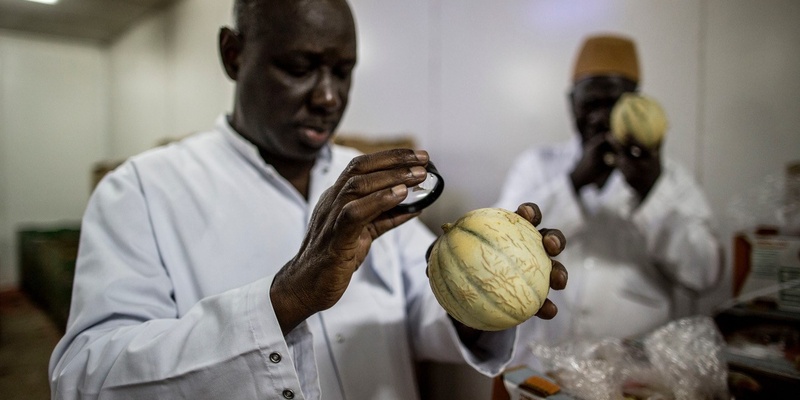Opinion: Plant resources threatened by pests and diseases
Posted on Wed, 21 Sep 2022, 13:58

© FAO/Marco Longari
By: Osama El-Lissy and Nicola Spence
Climate change has worsened the vulnerability of the world’s plant resources to pests and disease.
Imagine a world where farms bear no crops, forests have no trees and nature exists without plants.
Not only will our world look incredibly different, but humanity would likely cease to exist altogether. Plants provide 98 per cent of the air we breathe and 80 per cent of the food we eat. That’s how much our lives depend on plants, yet we often overlook how vital they are.
Our global plant resources are under threat from pests and diseases. Once plant pests are established in an area, it becomes nearly impossible and extremely costly to eradicate them. This sets back global efforts to achieve the Sustainable Development Goals by curtailing our ability to provide food security for all, protect our environment and biodiversity for future generations, and to ensure that crops and plant products are traded safely to help boost economic growth.
Every year, we lose as much as 40 per cent of global crop yields or around US$220 billion due to plant pests. In Africa alone, nearly US$10 billion worth of annual maize yield is lost due to fall armyworm, a dangerous transboundary pest that has now spread in more than 70 countries. Reducing this menace will help alleviate hunger of the type faced by some 828 million people around the world in 2021, according to the latest report of the UN’s Food and Agriculture Organization (FAO).
Climate change has increased pest incursions, particularly in new places where they had not been detected previously but have now thrived. Changing temperatures, humidity, light and wind are the second most important factors for pests to disperse, next to international travel and trade.
Invasive pests remain the main drivers of biodiversity loss. As the world becomes more globalised and interconnected, the increase in the movement of people and goods has been associated with the rise of the introduction and spread of plant pests across borders.
That is why global frameworks are crucial such as the International Plant Protection Convention (IPPC), an international treaty ratified by 184 countries which makes provisions for the protection and safeguarding of plants and facilitation of safe trade.
International Standards for Phytosanitary Measures — the gold standard in plant health — are in place for countries to adopt in their national legislation and import requirements. These standards range from pest surveillance, pest risk analysis, guidance for countries in developing pest eradication programmes, national reporting of important pests, and more.
Global network of plant experts
Building a global community of plant health experts and advocates is essential. The IPPC Secretariat works with partners and donors to develop standards, facilitate countries’ adoption of the Convention and implementation of standards, and build the capacity of national plant protection organisations.
Guides, training materials and e-learning courses help these plant stewards effectively carry out their duties in safeguarding plants. Innovative tools such as the ePhyto allow countries to trade safely using digital phytosanitary certificates that make the trade in plants safer, faster and cheaper.
Raising global awareness and action among the wider public is also important. In 2020, we celebrated the International Year of Plant Health through 680 events held in 86 countries.
On 12 May 2022, the first International Day of Plant Health was declared following its adoption at the General Assembly of the United Nations in March. We thank the governments of Zambia and Finland as tireless champions in tabling the resolution at the Assembly, supported by FAO and the IPPC Secretariat.
The IPPC Secretariat and the Department for Environment, Food and Rural Affairs of the UK this week partnered to gather the world’s best plant health experts and advocates. The first and largest International Plant Health Conference being held in London aims to address new and emerging challenges such as climate change impact, the increase in international trade, the rapid loss of biodiversity and new pest pathways such as e-commerce. We will explore more efficient policies, structures and mechanisms at the national, regional and global levels.
Much work remains in protecting our plants. We need to be cautious when bringing plants and plant products when traveling as these could carry plant pests and diseases. Likewise, we should be aware that buying plants and plant products online should come with phytosanitary certificates that attest they meet phytosanitary import requirements.
E-commerce is an emerging pathway for the introduction and spread of plant pests. Online purchases cross international borders through mail or express freight systems via air freight or sea containers. These purchases often include but are not limited to, ornamental plants, soil from imported plants, untreated wood packaging materials such as pallets and crates and even novelty items such as seed-infused “plantable bookmarks”.
We call on governments, legislators, policymakers and donors to invest in research, outreach and in building the capacity of national plant protection organisations, and to strengthen pest monitoring and early warning systems.
We need all industry actors and government partners to adhere to international plant health standards to mutually protect our plants, food supplies and our economies.
When we protect plants, we protect our health, our environment, our livelihoods and our lives.
Osama El-Lissy is the Secretary of the International Plant Protection Convention Secretariat.
Nicola Spence is Chief Plant Officer of the Department for Environment, Food and Rural Affairs of the United Kingdom.
This piece was produced by SciDev.Net’s Asia & Pacific desk.
Article originally published on SciDev.net.

